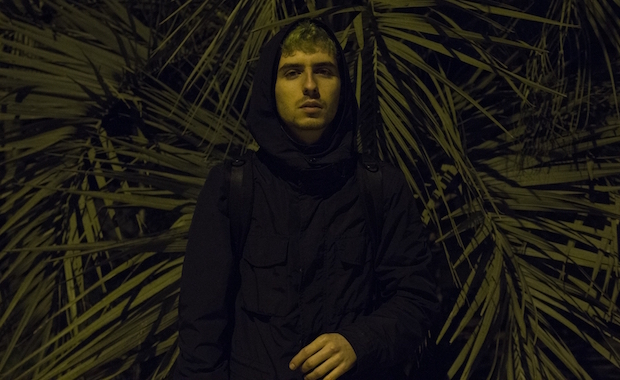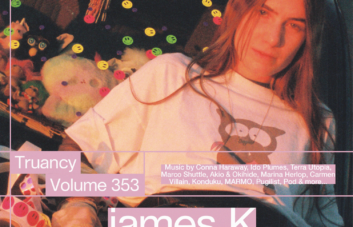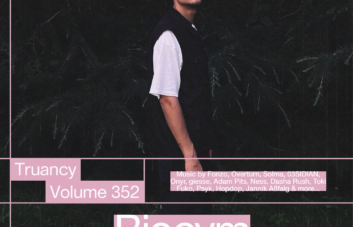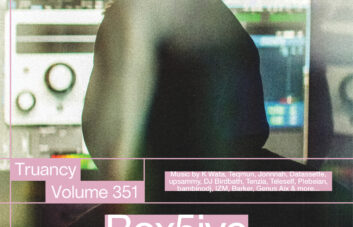Lechuga Zafiro is a wildly exciting producer from Montevideo, Uruguay. His name will certainly be familiar to you if you’ve spent any time indulging yourself in the NAAFI collective’s music, or spent any significant time tuned in to the likes of Rinse FM or NTS. It’s no surprise that his music is crossing these geographical boundaries and is now being played by the likes of the Her Records crew, Nguzunguzu and Air Max ’97. His music is at home in the club but not exclusively so, rhythmically complex and full of instrumentation that’s immediately intriguing. Up next for Lechuga Zafiro is Aequs Nyama, an EP that he’s putting out on Salviatek (a label he runs with Pobvio) and we’re delighted to be premiering a cut from it. The whole EP is scintillating listening but it also features a culturally important backstory that’s a vital part in getting a full comprehension of the record. With that in mind we got in touch to talk candombe drumming, Uruguay and everything else that plays a part in Aequs Nyama.
Lechuga Zafiro! Thanks for taking the time to talk to us. How are you today? “Good, thank you guys. I’m getting some label things done and searching for some music. It’s a pleasure to have this space to tell my story regarding Aequs Nyama.”
Sometimes I feel like we generalise when talking about South America and do a poor job of recognising that each country has its own culture, ways of thinking etc. So to start off with I wanted to ask what it means to you to be from Uruguay and how much it informs the music that you make. “Well, I have ambiguous feelings about my Uruguayan identity. It’s still a confusing concept to me. Uruguay isn’t the definition of “Latin America” that many people have. It’s not a super diverse society and it can feel claustrophobic here if you are not in contact with what’s happening in the rest of the world. There is a strong music identity here though, and candombe might be the rhythm that has influenced almost every genre: from tropical groups to intellectual music. The clave is in everyone’s DNA. It’s the simplest and most recognisable rhythm pattern that every Uruguayan knows. It’s proven to be fundamental in the way I produce music. I catch myself unconsciously replicating or deconstructing it in many of my productions.”
You mentioned candombe drums, and they feature heavily in Aequs Nyama. Would you tell us more about them, in both a historical and musical context? “Like the majority of the American nations, African descendants (first brought as slaves) have shaped Uruguay’s culture since its beginning, especially with music. Candombe is the result of various African groups expressing themselves through music, dance and religion, and coming up with something new. It’s essentially an Afro-Uruguayan expression. This rhythm is played by drummers on the streets of every neighbourhood today, and it’s present on many Uruguayan records. Drums in general have always fascinated me, a science of sequenced sounds and silences with its own intricate logic that gets inside people in a very subtle yet aggressive way. Candombe was the drumming culture I had most contact with, naturally, so it was easy for me to approach it and try to understand it. Many of my productions have some candombe influence, either adding its rhythm or its sounds. But I really don’t want to be tagged as a candombe artist, because I’m not. It’s not the only thing that influences me in the music I make, it’s just one of the many things I try to incorporate into my sound world.”
You feature candombe from three different candombe groups on the record, including one on the track we’re premiering. Triangulación Kultural, C 1080 and Ansina. Were these recordings made specifically for the record or were you working with existing ones? “It was mixed really. At the time that this project began, the C 1080 drummers and I were already doing some music experiments: improvising, recording and playing live shows. In August 2013, they were hired by a famous vocalist called Elli Medeiros to record drumming for her record. It was at Montevideo’s best music studio (Sondor) so C 1080 asked her if we could borrow one hour of her studio time to record our thing, and she said yes! Regarding Triangulación Kultural and Ansina, I was working as a sound man for a documentary in process called “Negro” (A Bandido production), which is about candombe culture. So we arranged another session in Sondor with Triangulación Kutlural. We set up a mobile studio in the streets of Palermo, Montevideo to record the Ansina guys.”
Did you talk to the artists at all about how they felt appearing in this more modern club context? “Of course. Part of this project also wants to give visibility to the founders and people who continue to express themselves through candombe. I talked to every representative of each group, sending them the music and telling them about the Aequs Nyama EP. No secrets here, they’ll receive 40% of each track sold in which they have participated. We thought it was a fair share regarding how much drumming there is on the record, and how it meshes with the other elements. Salviatek is still a super small label, so it won’t be significant money. It’s more to establish a true dialogue and show that we care.”
There’s such a vast assortment of sounds on the EP. We’ve got candombe, sci-fi effects, things from nature. Was this juxtaposition between old and new intentional? “I feel like the idea is nothing new. This approach of mixing the old with the new is kind of outdated to be honest. Aequs Nyama wasn’t about making a trendy, connected-to-the-club scene record. The process of finding the right sound foundations of the project took way too much time to try and make a record like that. It was more about focusing on finding my own voice through these elements I chose: candombe drumming, processed acoustic sounds, animal samples and sci-fi effects. It was really about making a sound statement. The project has now proven to be the base of how I express myself when producing music. I think it’s from now on that things will get interesting.”
There’s also a whole host of instrumentation on the record that I and I think a lot of people will be unfamiliar with. What sort of things did you use on Aequs Nyama? You’ve also mentioned previously that the EP features an instrument that you designed yourself? “Each track of the EP has its own specifically recorded leads: “C vs S” features a ceramic jar I stole, quickly recorded and secretly returned to a movie set while working at a film production. It’s also got a detuned and chopped Colombian gaita. “Tambor Espada” has got two Peruvian sikus. “Ayida Weddo” features a kind of primitive instrument I designed for a group called Camposanto: it’s basically a metal and wood structure that holds various wires and iron pipes, amplified with contact mics (à la Neubauten, but more amateur). All these instruments were recorded at my house and then heavily processed on my DAW.”
You created a website featuring a biotech device to go along with the EP’s release. What led you to doing this and could you explain the theory behind it for those of us who don’t speak Spanish? “Aequs Nyama is just a crazy idea that represents the human synthesis-meets-nature obsession we have over at Salviatek. Aequs Nyama would be a “biobot” device designed by Saviatek Corp, that helps your body to stay balanced. Through its tentacles, it’d understand what your body is lacking in terms of essential nutrients and chemicals. Based on that analysis, it would then print specially prepared food with e.g.: 50% lipids, 25% adrenaline, 25% minerals- through it’s farmbags®. This visual project is a small representation of what I see as the inevitable union between CPU’s and biological organisms. I also take it as a parody of the tech-companies from our era that have built an indisputable, almost religious reputation. The device was designed by Art Belikov. The website was done by Bao-Tran Tran. The final stage of the album cover was done by Pichón Ameba. You can find full info (in Spanish) and images here: http://aequsnyama.com/“
You’re putting this record out on Salviatek, which is your own label right? How and why did you start Salviatek? “Salviatek started last year as a party. Together with Pobvio, we felt we needed a space in Montevideo to show the music we produce and love. It felt natural to amplify this idea and start a label, that quickly wants to extend its arms to Brazil and Argentina where we have friends who are now working on future releases. A particular vision of club music unites us, free from structures, speed and genre rules as to what you should in a club.”
I noticed that you and Pobvio are going b2b with live drums from C 1080 for Salviatek 9! You must be excited about that? “Yes! We are working hard on a DJ set made of 90% new productions for this one, just rehearsing with the drummers and finding an interesting, danceable dialogue. The record’s release party is held in one of the most respected clubs in Montevideo called Phonotheque, so we’re excited about this one.”
Who are some of the artists you’re working with that we should be on the lookout for? “Pininga is an upcoming producer/writer from São Paulo we really dig. Superficie has also been doing stuff that we feel is in line with the label. Joao Pavigo has really crazy ideas, he’s from Rio, and there’s Tayhana who’s a great DJ from the Hiedrah crew (Buenos Aires).”
As well as the four originals, you’ve got two amazing remixes on the EP. Would you tell us about them and why you asked these producers in particular? “Remixes are from mobilegirl (Staycore) and Blacksea Não Maya (Principe). Mobilegirl is a cool gyal I met in Munich, we connected through Dinamarca. She’s super talented, and she’s also helped us a LOT in our Salviatek adventure. The Blacksea Não Maya guys were recommended by the Principe crew, who we love and respect. Look out for the Aequs Nyama remixes EP coming out soon too!”
You had a remix on the new MM EP, a track on the latest Track Meet compilation and of course you’re doing stuff with NAAFI. Would you tell us a little about these relationships? “NAAFI is crucial and a part of my music identity. We all share music within the crew and send feedback to each other. I definitely feel we have many philosophical and aesthetic ideas in common. The MM remix was crazy, as I was already a fan of Her Records and playing “9th Ritual” when they asked me to do the remix. The OG is still way better though hehe! Ynfinyt Scroll wrote me at the beginning of the year to contribute to their Track Meet comp, and the idea sounded cool.”
OK, last question! We’ve got this EP and your Salviatek shows. What else is coming up for you? “Still working on my NAAFI EP and the Aequs Nyama remixes EP. That means loads of studio and office work, which is great!”
Aequs Nyama will be released on Monday and you’ll be able to buy it here.




